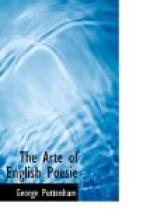he may vse in any verse both his
comma, colon,
and
interrogatiue point, as well as in prose.
But our auncient rymers, as
Chaucer, Lydgate
& others, vsed these
Cesures either very seldome,
or not at all, or else very licentiously, and many
times made their meetres (they called them riding ryme)
of such vnshapely wordes as would allow no conuenient
Cesure, and therefore did let their rymes runne
out at length, and neuer stayd till they came to the
end: which maner though it were not to be misliked
in some sort of meetre, yet in euery long verse the
Cesure ought to be kept precisely, if it were
but to serue as a law to correct the licentiousnesse
of rymers, besides that it pleaseth the eare better,
& sheweth more cunning in the maker by following the
rule of his restraint. For a rymer that will be
tyed to no rules at all, but range as he list, may
easily vtter what he will: but such maner of
Poesie is called in our vulgar, ryme dogrell, with
which rebuke we will in no case our maker should be
touched. Therfore before all other things let
his ryme and concordes be true, cleare, and audible
with no lesse delight, then almost the strayned note
of a Musicians mouth, & not darke or wrenched by wrong
writing as many doe to patch vp their meetres, and
so follow in their arte neither rule, reason, nor
ryme. Much more might be sayd for the vse of your
three pauses,
comma,
colon, &
periode,
for perchance it be not all a matter to vse many
commas,
and few, nor
colons likewise, or long or short
periodes, for it is diuersly vsed, by diuers
good writers. But because it apperteineth more
to the oratour or writer in prose then in verse, I
will say no more in it, then thus, that they be vsed
for a commodious and sensible distinction of clauses
in prose, since euery verse is as it were a clause
of it selfe and limited with a
Cesure howsoeuer
the sence beare, perfect or imperfect, which difference
is obseruable betwixt the prose and the meeter.
CHAP. V.
Of Proportion in Concord, called Symphonie or rime.
Because we vse the word rime (though by maner of abusion)
yet to helpe that fault againe we apply it in our
vulgar Poesie another way very commendably & curiously.
For wanting the currantnesse of the Greeke and Latine
feete, in stead thereof we make in th’ends of
our verses a certaine tunable sound: which anon
after with another verse reasonably distant we accord
together in the last fall or cadence: the eare
taking pleasure to heare the like tune reported, and
to feele hie returne. And for this purpose serue
the monosillables of our English Saxons excellently
well, because they do naturally and indifferently
receiue any accent, & in them if they finish the verse,
resteth the shrill accent of necessitie, and so doth
it not in the last of euery bissillable, nor
of euery polisillable word: but to the




